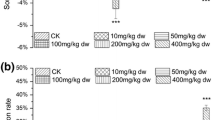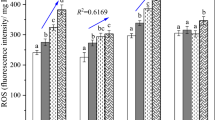Abstract
To evaluate the potential ecotoxicity of ethiprole and early warning to earthworms (Eisenia fetida), different concentrations (0 mg·kg−1, 416 mg·kg−1, 625 mg·kg−1, and 1000 mg·kg−1) of ethiprole were added to artificial soil. The key bioindicators were measured and screened at 3 days, 7 days, 14 days, 21 days, and 28 days. The results show that the activity of catalase (CAT) was inhibited for all treatments during the whole exposure period. Besides, the olive tail moment (OTM) value increased gradually as the concentration got higher, which exhibited a dose-time-dependent relationship. Superoxide dismutase (SOD) gene reached the maximum on the 7th day. Mitochondrial large ribosomal RNA (l-rRNA) subunit gene was always in a downregulated state as the concentration increased. Our results show that different concentrations of ethiprole induced certain oxidative stress, DNA damage, and genotoxicity in earthworms. The CAT activity, OTM, and SOD gene could be the most sensitive biomarkers to monitor the toxicity of ethiprole in the soil.




Similar content being viewed by others
References
Bommer UA, Thiele BJ (2004) The translationally controlled tumor protein (TCTP). Int J Biochem Cell Biol 36(3):379–385. https://doi.org/10.1016/S1357-2725(03)00213-9
Brulle F, Mitta G, Cocquerelle C, Vieau D, Lemière S, Leprêtre A, Vandenbulcke F (2006) Cloning and real-time PCR testing of 14 potential biomarkers in Eisenia fetida following cadmium exposure. Environ Sci Technol 40:2844–2850. https://doi.org/10.1021/es052299x
Caboni P, Sammelson RE, Casida JE (2003) Phenylpyrazole insecticide photochemistry, metabolism, and GABAergic action: ethiprole compared with fipronil. J Agric Food Chem 51(24):7055–7061. https://doi.org/10.1021/jf030439l
Cang T, Zhang H, Wang XQ, Wu CG, Chen LZ, Wang XY, Xu MF, Cai LM, Zhao XP (2016) Acute toxicities and preliminary risk evaluation of chiral ethiprole to three non-target organisms. Chinese. J Pesticide Sci 18(1):65–70 (in Chinese). 10.16801/j.issn.1008-7303.2016.0007
Chen C, Zhou QX, Liu S, Xiu ZM (2011) Acute toxicity, biochemical and gene expression responses of the earthworm Eisenia fetida exposed to polycyclic musks. Chemosphere 83:1147–1154. https://doi.org/10.1016/j.chemosphere.2011.01.006
Ching EWK, Siu WHL, Lam PKS, Xu LH, Zhang YY, Richardson BJ, Wu RSS (2001) DNA adduct formation and DNA strand breaks in green-lipped mussels (Perna viridis) exposed to benzo[a]pyrene: dose- and time-dependent relationships. Mar Pollut Bull 42(7):603–610. https://doi.org/10.1016/S0025-326X(00)00209-5
Di Z, Franklin L, Douglas W, Mnjoyan ZH, Ken F (2002) Physical and functional interaction between myeloid cell leukemia 1 protein (MCL1) and fortilin. The potential role of MCL1 as a fortilin chaperone. J Biol Chem 277:37430–37438. https://doi.org/10.1074/jbc.M207413200
Elzaki MEA, Zhang W, Han Z (2015) Cytochrome P450 CYP4DE1 and CYP6CW3v2 contribute to ethiprole resistance in Laodelphax striatellus (Fallén). Insect Mol Biol 24(3):368–376. https://doi.org/10.1111/imb.12164
Gao J, Wang F, Cui JN, Zhang Q, Wang P, Liu DH (2021) Assessment of toxicity and environmental behavior of chiral ethiprole and its metabolites using zebrafish model. J Hazard Mater 414:125492. https://doi.org/10.1016/j.jhazmat.2021.125492
Gao Y, Sun X, Gu X, Sun Z (2013) Gene expression responses in different regions of Eisenia fetida with antiparasitic albendazole exposure. Ecotox Environ Safe 89:239–244. https://doi.org/10.1016/j.ecoenv.2012.12.004
IUPAC (International Union of Pure and Applied Chemistry) (2018) Ethiprole. URL. https://sitem.herts.ac.uk/aeru/iupac/Reports/1227.htm. (Accessed 15 May 2019).
Lin DS, Zhou QX, Xie XJ, Liu Y (2010) Potential biochemical and genetic toxicity of triclosan as an emerging pollutant on earthworms (Eisenia fetida). Chemosphere 81:1328–1333. https://doi.org/10.1016/j.chemosphere.2010.08.027
Liu S, Zhou Q, Wang Y (2011) Ecotoxicological responses of the earthworm Eisenia fetida exposed to soil contaminated with HHCB. Chemosphere 83:1080–1086. https://doi.org/10.1016/j.chemosphere.2011.01.046
Liu T, Zhang X, Wang X, Chen D, Li Y, Wang F (2018) Comparative toxicity and bioaccumulation of two dinotefuran metabolites, UF and DN, in earthworms (Eisenia fetida). Environ Pollut 234:988–996. https://doi.org/10.1016/j.envpol.2017.12.007
Liu Y, Wang C, Qi SZ, He J, Bai YC (2021) The sublethal effects of ethiprole on the development, defense mechanism, and immune pathways of honeybees (Apis mellifera L.). Environ Geochem Health 43:461–473. https://doi.org/10.1007/s10653-020-00736-7
Livak KJ, Schmittgen TD (2001) Analysis of relative gene expression data using real-time quantitative PCR and the 2−ΔΔCT method. Methods 25:402–408. https://doi.org/10.1006/meth.2001.1262
Martin FL, Piearce TG, Hewer A, Phillips DH, Semple KT (2005) A biomarker model of sublethal genotoxicity (DNA single-strand breaks and adducts) using the sentinel organism Aporrectodea longa in spiked soil. Environ Pollut 138:307–315. https://doi.org/10.1016/j.envpol.2005.03.012
McClellan AJ, Xia Y, Deutschbauer AM, Davis RW, Gerstein M, Frydman J (2007) Diverse cellular functions of the Hsp90 molecular chaperone uncovered using systems approaches. Cell 131:121–135. https://doi.org/10.1016/j.cell.2007.07.036
Neuparth T, Correia AD, Costa FO, Lima G, Costa MH (2005) Multi-level assessment of chronic toxicity of estuarine sediments with the amphipod Gammarus locusta: I. Biochemical endpoints. Mar Environ Res 60:69–91. https://doi.org/10.1016/j.marenvres.2004.08.006
Ning YC, Jin CM, Zhou HR, Wang EZ, Huang XN (2018) Screening indices for cadmium-contaminated soil using earthworm as bioindicator. Environ Sci Pollut Res 25:32358–32372. https://doi.org/10.1007/s11356-018-3207-4
Niu XY, Qi SZ, Wu LM, Zhang ZY, Shi MW (2019) Toxicity studies of ethiprole suspension concentrate to newly emerged honey bees (Apis mellifera L.). Asian Journal of Ecotoxicology 14(3):203-213 (in Chinese). 10.7524/AJE.1673-5897.20180517001
OECD (1984) Earthworm, acute toxicity tests. Guideline for Testing Chemicals. No. 207. OECD, Paris, France
OECD (2016) Earthworm reproduction test. Guideline for Testing Chemicals. No. 222. OECD, Paris, France
Oost RVD, Beyer J, Vermeulen NPE (2003) Fish bioaccumulation and biomarkers in environmental risk assessment: a review. Environ Toxicol Pharmacol 13:57–149. https://doi.org/10.1016/s1382-6689(02)00126-6
Qiao M, Chen Y, Wang CX, Wang Z, Zhu YG (2007) DNA damage and repair process in earthworm after in-vivo and in vitro exposure to soils irrigated by wastewaters. Environ Pollut 148(1):141–147. https://doi.org/10.1016/j.envpol.2006.10.033
Reinecke SA, Reinecke AJ (2004) The comet assay as biomarker of heavy metal genotoxicity in earthworms. Arch Environ Contam Toxicol 46:208–215. https://doi.org/10.1007/s00244-003-2253-0
Ribera D, Narbonne JF, Arnaud C, Saint-Denis M (2001) Biochemical responses of the earthworm Eisenia fetida andrei exposed to contaminated artificial soil, effects of carbaryl. Soil Biol Biochem 33:1123–1130. https://doi.org/10.1016/S0038-0717(01)00035-9
Sanchez-Hernandez JC (2006) Earthworm biomarkers in ecological risk assessment. Rev Environ Contam Toxicol 188:85–126. https://doi.org/10.1007/978-0-387-32964-2_3
Santiago M, Paula D, Inmaculada D, José Antonio C, Felipe C (2008) Genotoxicity detected in wild mice living in a highly polluted wetland area in south western Spain. Environ Pollut 153:590–593. https://doi.org/10.1016/j.envpol.2007.09.008
Scandalios JG (2005) Oxidative stress: molecular perception and transduction of signals triggering antioxidant gene defenses. Braz J Med Biol Res 38:995–1014. https://doi.org/10.1590/s0100-879x2005000700003
Schreck E, Geret F, Gontier L, Treilhou M (2008) Neurotoxic effect and metabolic responses induced by a mixture of six pesticides on the earthworm Aporrectodea caliginosa nocturna. Chemosphere 71:1832–1839. https://doi.org/10.1016/j.chemosphere.2008.02.003
Singh NP, McCoy MT, Tice RR, Schneider EL (1988) A simple technique for quantitation of low levels of DNA damage in individual cells. Exp Cell Res 175:184–191. https://doi.org/10.1016/0014-4827(88)90265-0
Singh NS, Sharma R, Singh SK, Singh DK (2021) A comprehensive review of environmental fate and degradation of fipronil and its toxic metabolites. Environ Res 199:111316. https://doi.org/10.1016/j.envres.2021.111316
Singh S, Eapen S, D’Souza SF (2006) Cadmium accumulation and its influence on lipid peroxidation and antioxidative system in an aquatic plant, Bacopa monnieri L. Chemosphere 62(2):233–246. https://doi.org/10.1016/j.chemosphere.2005.05.017
Song Y, Zhu LS, Wang J, Wang JH, Liu W, Xie H (2009) DNA damage and effects on antioxidative enzymes in earthworm (Eisenia foetida) induced by atrazine. Soil Biol Biochem 41(5):905–909. https://doi.org/10.1016/j.soilbio.2008.09.009
Telerman A, Amson R (2009) The molecular programme of tumour reversion: the steps beyond malignant transformation. Nature Reviews Cancer 9:206. https://doi.org/10.1038/nrc2589
Tian FJ (2016) Research on degration products and pathway of ethiprole in different environments. Dissertation,. Henan Institute of Science and Technology
Wang J, Wang G, Zhu L (2016) DNA damage and oxidative stress induced by imidacloprid exposure in the earthworm Eisenia fetida. Chemosphere 144:510–517. https://doi.org/10.1016/j.chemosphere.2015.09.004
Wu W, Guo M, Shi L, Kong D, Shan Z (2012a) Study on residue decline dynamics of ethiprole and its metabolic products in paddy field. Ecology and Environmental Sciences 21(5):957–962 (in Chinese). https://doi.org/10.16258/j.cnki.1674-5906.2012.05.021
Wu S, Zhang H, Zhao S, Wang J, Li H, Chen J (2012b) Biomarker responses of earthworms (Eisenia fetida) exposured to phenanthrene and pyrene both singly and combined in microcosms. Chemosphere 87:285–293. https://doi.org/10.1016/j.chemosphere.2011.11.055
Yang Y, Xiao Y, Chang Y, Cui Y, Klobucar G, Li M (2018) Intestinal damage, neurotoxicity and biochemical responses caused by tris (2-chloroethyl) phosphate and tricresyl phosphate on earthworm. Ecotoxicol Environ Saf 158:78–86. https://doi.org/10.1016/j.ecoenv.2018.04.012
Zhang Q, Shi HY, Gao BB, Tian MM, Hua XD, Wang MH (2016) Enantioseparation and determination of the chiral phenylpyrazole insecticide ethiprole in agricultural and environmental samples and its enantioselective degradation in soil. Sci Total Environ 542:845–853. https://doi.org/10.1016/j.scitotenv.2015.10.132
Zhang Q, Zhang G, Yin P, Lv Y, Yuan S, Chen J, Wei B, Wang C (2015a) Toxicological effects of soil contaminated with spirotetramat to the earthworm Eisenia fetida. Chemosphere 139:138–145. https://doi.org/10.1016/j.chemosphere.2015.05.091
Zhang QM, Zhang BH, Wang CX (2014) Ecotoxicological effects on the earthworm Eisenia fetida following exposure to soil contaminated with imidacloprid. Environ Sci Pollut Res 21:12345–12353. https://doi.org/10.1007/s11356-014-3178-z
Zhang W, Liu K, Li J, Liang J, Lin KF (2015b) Impacts of BDE209 addition on Pb uptake, subcellular partitioning and gene toxicity in earthworm (Eisenia fetida). J Hazard Mater 300:737–744. https://doi.org/10.1016/j.jhazmat.2015.08.014
Zhou M, Cheng YP, Zhang Y, Liu ZQ, Zhang MH (2022) Oxidative stress, DNA damage, and gene expression induced by flufiprole enantiomers in the earthworms (Eisenia fetida). Comp Biochem Physiol C Toxicol Pharmacol 257:109341. https://doi.org/10.1016/j.cbpc.2022.109341
Zhou Z, Wu XZ, Lin ZQ, Pang SM, Mishra S, Chen SH (2021) Biodegradation of fipronil: current state of mechanisms of biodegradation and future perspectives. Appl Microbiol Biot 105:7695–7708. https://doi.org/10.1007/s00253-021-11605-3
Data availability
All data generated or analyzed during this study are included in this paper.
Funding
This work was supported by the National Natural Science Foundation of China (31572034).
Author information
Authors and Affiliations
Contributions
All authors contributed to the study conception and design. Material preparation, data collection, and analysis were performed by Caixia Zhang, Fuhao Wang, and Peipei Hao. The first draft of the manuscript was written by Youpu Cheng and Min Zhou. All authors read and approved the final manuscript.
Corresponding author
Ethics declarations
Ethical approval and consent to participate
All applicable international, national, and/or institutional guidelines for the care and use of animals (Eisenia fetida) were followed. Consent to participate is not applicable.
Consent for publication
Not applicable.
Competing interests
The authors declare no competing interests.
Additional information
Responsible Editor: Chris Lowe
Publisher’s Note
Springer Nature remains neutral with regard to jurisdictional claims in published maps and institutional affiliations.
Rights and permissions
Springer Nature or its licensor (e.g. a society or other partner) holds exclusive rights to this article under a publishing agreement with the author(s) or other rightsholder(s); author self-archiving of the accepted manuscript version of this article is solely governed by the terms of such publishing agreement and applicable law.
About this article
Cite this article
Zhou, M., Zhang, C., Wang, F. et al. Oxidative stress, DNA damage, and gene expression in earthworms (Eisenia fetida) exposure to ethiprole. Environ Sci Pollut Res 31, 27679–27688 (2024). https://doi.org/10.1007/s11356-024-32964-0
Received:
Accepted:
Published:
Issue Date:
DOI: https://doi.org/10.1007/s11356-024-32964-0




